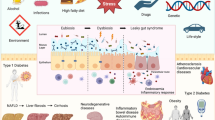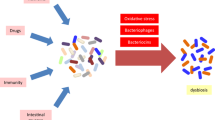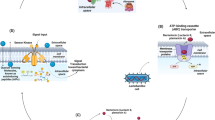Abstract
Inflammatory bowel diseases (IBDs) are chronic and recurrent diseases that often occur in young people and place a heavy burden on public health in both developed and developing countries. Melatonin has been confirmed to be useful in various diseases, including Alzheimer’s disease, liver injuries and diseases, and cancers, while its role in IBDs remains unclear. To uncover the function of melatonin in IBDs, three intestinal models, including Caco-2 cells, 3D intestinal organoids and intestinal explants, were used. It was found that different concentrations of melatonin could significantly inhibit the expression levels of NFκB and its downstream cytokines, including IL6 and IL8 in Caco-2 cells (*P < 0.05, **P < 0.01), 3D intestinal organoids (*P < 0.05, **P < 0.01) and intestinal explants (*P < 0.05, **P < 0.01). Melatonin abolished the activation of LPS on the expression levels of NFκB, IL6, and IL8 in three intestinal models (*P < 0.05, **P < 0.01, ***P < 0.001). Importantly, the roles of melatonin in the regulation of inflammation was dependent on its receptor (i.e., MTNR1), since it was found that silencing of the melatonin receptor (MTNR1A) abolished the reduction in inflammation induced by melatonin in Caco-2 cells (***P < 0.001) and 3D intestinal organoids (***P < 0.01, ****P < 0.0001). Herein, the findings in this study might provide useful information for understanding the pathogenesis of IBDs and developing novel drugs to treat the diseases.





Similar content being viewed by others
Change history
08 March 2022
A Correction to this paper has been published: https://doi.org/10.1007/s10787-022-00953-9
Abbreviations
- IBDs:
-
Inflammatory bowel diseases
- 3D:
-
Three dimensional
- MTNR:
-
The melatonin receptor
- CD:
-
Crohn’s disease
- UC:
-
Ulcerative colitis
- IL-1β:
-
Interleukin-1β
- LPS:
-
Lipopolysaccharide
- IECM:
-
Intestinal explant culture medium
- EFG:
-
Epidermal growth factor
- SDS:
-
Sodium dodecyl sulfate
- O/N:
-
Overnight
- SD:
-
Standard deviation
- DSS:
-
Dextran sulfate sodium
- AR-V7:
-
Androgen receptor splice variant-7
References
Acuña-Castroviejo D, Escames G, Venegas C, Díaz-Casado ME, Lima-Cabello E, López LC, Rosales-Corral S, Tan D, Reiter RJ (2014) Extrapineal melatonin: sources, regulation, and potential functions. Cell Mol Life Sci 71:2997–3025
Carrillo-Vico A, Lardone PJ, Alvarez-Sanchez N, Rodriguez-Rodriguez A, Guerrero JM (2013) Melatonin: buffering the immune system. Int J Mol Sci 14:8638–8683
Chaudhary S, Islam Z, Mishra V, Rawat S, Ashraf G, Kolatkar PR (2019) Sox2: a regulatory factor in tumorigenesis and metastasis. Curr Protein Pept Sci 20:495–504
Chitimus DM, Popescu MR, Voiculescu SE, Panaitescu AM, Pavel B, Zagrean L, Zagrean A (2020) Melatonin’s impact on antioxidative and anti-inflammatory reprogramming in homeostasis and disease. Biomolecules 10:1211
Cui J, Li Z, Zhuang S, Qi S, Li L, Zhou J, Zhang W, Zhao Y (2018) Melatonin alleviates inflammation-induced apoptosis in human umbilical vein endothelial cells via suppression of Ca(2+)-XO-ROS-Drp1-mitochondrial fission axis by activation of AMPK/SERCA2a pathway. Cell Stress Chaperones 23:281–293
Cury DB, Oliveira R, Cury MS (2019) Inflammatory bowel diseases: time of diagnosis, environmental factors, clinical course, and management - a follow-up study in a private inflammatory bowel disease center (2003–2017). J Inflamm Res 12:127–135
DeGruttola AK, Low D, Mizoguchi A, Mizoguchi E (2016) Current understanding of dysbiosis in disease in human and animal models. Inflamm Bowel Dis 22:1137–1150
Foulke-Abel J, Yu H, Sunuwar L, Lin R, Fleckenstein JM, Kaper JB, Donowitz M (2020) Phosphodiesterase 5 (PDE5) restricts intracellular cGMP accumulation during enterotoxigenic Escherichia coli infection. Gut Microbes 2:1752125
Frolkis A, Dieleman LA, Barkema HW, Panaccione R, Ghosh S, Fedorak RN, Madsen K, Kaplan GG, Alberta IBDC (2013) Environment and the inflammatory bowel diseases. Can J Gastroenterol 27:e18–e24
Jaworek J, Leja-Szpak A, Nawrot-Porabka K, Szklarczyk J, Kot M, Pierzchalski P, Goralska M, Ceranowicz P, Warzecha Z, Dembinski A, Bonior J (2017) Effects of melatonin and its analogues on pancreatic inflammation, enzyme secretion, and tumorigenesis. Int J Mol Sci 18:1014
Kennaway DJ (2020) Melatonin rich foods in our diet: food for thought or wishful thinking? Food Funct 11:9359–9369
Khor B, Gardet A, Xavier RJ (2011) Genetics and pathogenesis of inflammatory bowel disease. Nature 474:307–317
Leonetti D, Estephan H, Ripoche N, Dubois N, Aguesse A, Gouard S, Brossard L, Chiavassa S, Corre I, Pecqueur C, Neunlist M, Hadchity E, Gaugler MH, Mahe MM, Paris F (2020) Secretion of acid sphingomyelinase and ceramide by endothelial cells contributes to radiation-induced intestinal toxicity. Cancer Res 80:2651–2662
Li N, Shi R (2018) Updated review on immune factors in pathogenesis of Crohn’s disease. World J Gastroenterol 24:15–22
Lin GJ, Huang SH, Chen SJ, Wang CH, Chang DM, Sytwu HK (2013) Modulation by melatonin of the pathogenesis of inflammatory autoimmune diseases. Int J Mol Sci 14:11742–11766
Liu VWS, Yau WL, Tam CW, Yao KM, Shiu SYW (2017) Melatonin inhibits androgen receptor splice variant-7 (AR-V7)-induced nuclear factor-kappa B (NF-kappaB) activation and NF-kappaB activator-induced AR-V7 expression in prostate cancer cells: potential implications for the use of melatonin in castration-resistant prostate cancer (CRPC) therapy. Int J Mol Sci 18:1130
Mannino G, Caradonna F, Cruciata I, Lauria A, Perrone A, Gentile C (2019) Melatonin reduces inflammatory response in human intestinal epithelial cells stimulated by interleukin-1beta. J Pineal Res 67:e12598
Markus RP, Cecon E, Pires-Lapa MA (2013) Immune-pineal axis: nuclear factor kappaB (NF-kB) mediates the shift in the melatonin source from pinealocytes to immune competent cells. Int J Mol Sci 14:10979–10997
Matsuoka K, Kobayashi T, Ueno F, Matsui T, Hirai F, Inoue N, Kato J, Kobayashi K, Kobayashi K, Koganei K, Kunisaki R, Motoya S, Nagahori M, Nakase H, Omata F, Saruta M, Watanabe T, Tanaka T, Kanai T, Noguchi Y, Takahashi KI, Watanabe K, Hibi T, Suzuki Y, Watanabe M, Sugano K, Shimosegawa T (2018) Evidence-based clinical practice guidelines for inflammatory bowel disease. J Gastroenterol 53:305–353
McDaniel DK, Eden K, Ringel VM, Allen IC (2016) Emerging roles for noncanonical NF-kappaB signaling in the modulation of inflammatory bowel disease pathobiology. Inflamm Bowel Dis 22:2265–2279
Mistraletti G, Paroni R, Umbrello M, D’Amato L, Sabbatini G, Taverna M, Formenti P, Finati E, Favero G, Bonomini F, Rezzani R, Reiter RJ, Iapichino G (2017) Melatonin pharmacological blood levels increase total antioxidant capacity in critically Ill patients, randomized controlled trial. Int J Mol Sci 18:759
Molodecky NA, Kaplan GG (2010) Environmental risk factors for inflammatory bowel disease. Gastroenterol Hepatol (n Y) 6:339–346
Nau GJ, Horzempa J, O’Dee D, Brown MJ, Russo BC, Hernandez A, Dillon ST, Cheng J, Kane LP, Sanker S, Hukriede NA (2019) A predicted Francisella tularensis DXD-motif glycosyltransferase blocks immune activation. Virulence 10:643–656
Oishi A, Cecon E, Jockers R (2018) Melatonin receptor signaling: impact of receptor oligomerization on receptor function. Int Rev Cell Mol Biol 338:59–77
Pan P, Zhang H, Su L, Wang X, Liu D (2018) Melatonin balance the autophagy and apoptosis by regulating UCP2 in the LPS-induced cardiomyopathy. Molecules 23:675
Park YS, Chung SH, Lee SK, Kim JH, Kim JB, Kim TK, Kim DS, Baik HW (2015) Melatonin improves experimental colitis with sleep deprivation. Int J Mol Med 35:979–986
Peñaranda DS, Bäuerl C, Tomás-Vidal A, Jover-Cerdá M, Estruch G, Martínez GP, Llorens SM (2020) Intestinal explant cultures from gilthead seabream (Sparus aurata, L.) allowed the determination of mucosal sensitivity to bacterial pathogens and the impact of a plant protein diet. Int J Mol Sci 21:7584
Plaimee P, Weerapreeyakul N, Thumanu K, Tanthanuch W, Barusrux S (2014) Melatonin induces apoptosis through biomolecular changes, in SK-LU-1 human lung adenocarcinoma cells. Cell Prolif 47:564–577
Plaimee P, Weerapreeyakul N, Barusrux S, Johns NP (2015) Melatonin potentiates cisplatin-induced apoptosis and cell cycle arrest in human lung adenocarcinoma cells. Cell Prolif 48:67–77
Rosen MJ, Dhawan A, Saeed SA (2015) Inflammatory bowel disease in children and adolescents. JAMA Pediatr 169:1053–1060
Russo I, Zeppa P, Iovino P, Del Giorno C, Zingone F, Bucci C, Puzziello A, Ciacci C (2016) The culture of gut explants: a model to study the mucosal response. J Immunol Methods 438:1–10
Sato T, Vries RG, Snippert HJ, van de Wetering M, Barker N, Stange DE, van Es JH, Abo A, Kujala P, Peters PJ, Clevers H (2009) Single Lgr5 stem cells build crypt-villus structures in vitro without a mesenchymal niche. Nature 459:262–265
Sato T, van Es JH, Snippert HJ, Stange DE, Vries RG, van den Born M, Barker N, Shroyer NF, van de Wetering M, Clevers H (2011) Paneth cells constitute the niche for Lgr5 stem cells in intestinal crypts. Nature 469:415–418
Shrestha S, Zhu J, Wang Q, Du X, Liu F, Jiang J, Song J, Xing J, Sun D, Hou Q, Peng Y, Zhao J, Sun X, Song X (2017) Melatonin potentiates the antitumor effect of curcumin by inhibiting IKKbeta/NF-kappaB/COX-2 signaling pathway. Int J Oncol 51:1249–1260
Shukla M, Govitrapong P, Boontem P, Reiter RJ, Satayavivad J (2017) Mechanisms of melatonin in alleviating Alzheimer’s disease. Curr Neuropharmacol 15:1010–1031
Song J, Kang SM, Lee KM, Lee JE (2015) The protective effect of melatonin on neural stem cell against LPS-induced inflammation. Biomed Res Int 2015:854359
Tan D, Manchester LC, Sanchez-Barcelo E, Mediavilla MD, Reiter RJ (2010) Significance of high levels of endogenous melatonin in Mammalian cerebrospinal fluid and in the central nervous system. Curr Neuropharmacol 8:162–167
Tsilingiri K, Sonzogni A, Caprioli F, Rescigno M (2013) A novel method for the culture and polarized stimulation of human intestinal mucosa explants. J vis Exp 75:e4368
Vezza T, Algieri F, Rodríguez-Nogales A, Garrido-Mesa J, Pilar Utrilla M, Talhaoui N, Gómez-Caravaca AM, Segura-Carretero A, Rodríguez-Cabezas ME, Monteleone G, Gálvez J (2017) Immunomodulatory properties of Olea europaea leaf extract in intestinal inflammation. Mol Nutr Food Res 61:1601066
Wang H, Liu JS, Peng SH, Deng XY, Zhu DM, Javidiparsijani S, Wang GR, Li DQ, Li LX, Wang YC, Luo JM (2013) Gut-lung crosstalk in pulmonary involvement with inflammatory bowel diseases. World J Gastroenterol 19:6794–6804
Wang Z, Meng Q, Zhu X, Sun S, Gao S, Gou Y, Liu A (2019) Evaluation and validation of reference genes for quantitative real-time PCR in Helopeltis theivora waterhouse (Hemiptera: Miridae). Sci Rep 9:13291
Wlodarska M, Kostic AD, Xavier RJ (2015) An integrative view of microbiome-host interactions in inflammatory bowel diseases. Cell Host Microbe 17:577–591
Yan G, Yu L, Jiang S, Zhu J (2018) Melatonin antagonizes oxidative stress-induced mitochondrial dysfunction in retinal pigmented epithelium cells via melatonin receptor 1 (MT1). J Toxicol Sci 43:659–669
Yerushalmy-Feler A, Kern-Isaacs S, Cohen S (2018) CMV infection in pediatric IBD. Curr Gastroenterol Rep 20:13–13
Yin Y, Bijvelds M, Dang W, Xu L, van der Eijk AA, Knipping K, Tuysuz N, Dekkers JF, Wang Y, de Jonge J, Sprengers D, van der Laan LJ, Beekman JM, Ten Berge D, Metselaar HJ, de Jonge H, Koopmans MP, Peppelenbosch MP, Pan Q (2015) Modeling rotavirus infection and antiviral therapy using primary intestinal organoids. Antiviral Res 123:120–131
Yin Y, Dang W, Zhou X, Xu L, Wang W, Cao W, Chen S, Su J, Cai X, Xiao S, Peppelenbosch MP, Pan Q (2018) PI3K-Akt-mTOR axis sustains rotavirus infection via the 4E-BP1 mediated autophagy pathway and represents an antiviral target. Virulence 9:83–98
Yin YB, de Jonge HR, Wu X, Yin YL (2019) Mini-gut: a promising model for drug development. Drug Discov Today 24:1784–1794
Yin YB, Liu PY, Shi YH, Li P (2021) Single-cell sequencing and organoids: a powerful combination for modelling organ development and diseases. Rev Physiol Biochem Pharmacol 179:189–210
Zhang JJ, Meng X, Li Y, Zhou Y, Xu DP, Li S, Li HB (2017) Effects of melatonin on liver injuries and diseases. Int J Mol Sci 18:673
Author information
Authors and Affiliations
Contributions
XZ and XM conceived the study. XZ, XY, and XZ designed experiments, and XZ and XZ performed most of the experiments, data collection and data analysis. XZ and XZ wrote the manuscript, which was reviewed by all the authors.
Corresponding author
Ethics declarations
Conflict of interest
The authors have no competing financial interests.
Ethical statement
The animal experiment was performed in strict compliance with the animal experiment guidelines of Tangshan Workers’ Hospital (2020001). The study was approved by the ethics committee of Tangshan Workers’ Hospital (TWH-2020001) for using animals to perform experiments including isolation of cells for the culture of organoids. Informed consent was obtained from the patients, and this study was approved by the ethical committee of Tangshan Workers’ Hospital.
Additional information
Publisher's Note
Springer Nature remains neutral with regard to jurisdictional claims in published maps and institutional affiliations.
Rights and permissions
About this article
Cite this article
Xi-Zhang, Yuan, Xq. & Zhang, Xm. Melatonin reduces inflammation in intestinal cells, organoids and intestinal explants. Inflammopharmacol 29, 1555–1564 (2021). https://doi.org/10.1007/s10787-021-00869-w
Received:
Accepted:
Published:
Issue Date:
DOI: https://doi.org/10.1007/s10787-021-00869-w




